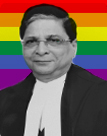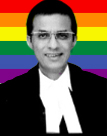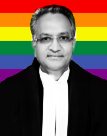Earlier today, a five-judge constitution bench pronounced that gay sex among consenting adults is not a criminal offence. Even as celebrations have broken out all over the country including at the Vice HQs, we find ourselves a bit blown away by the many moral, philosophical, and inward-looking statements that were made. In case you were wondering who these guys are who are going down in history as heroes, here’s a quick primer. Chief Justice Dipak Misra
Chief Justice Dipak Misra
Who: The current and 45th Chief Justice of India will go down in history as the one who’s lived through one of the most volatile periods of Indian judiciary. He retires on October 2. But as it happens to be Gandhi’s birth anniversary, October 1 will be his last working day. What a note to go out on.
Tell me more: Misra is known for heading the bench that dismissed Mumbai serial blasts convict Yakub Memon’s plea seeking a stay on his execution, as well as upholding the death sentence given to Nirbhaya’s killers. He is also the one who passed the judgement that required the Delhi Police to upload FIRs on their website within 24 hours of registration so the accused could download them and seek redressal of their grievances. But umm… he was also part of the bench that ordered the playing of the National Anthem in the beginning of a film in theatres as mandatory, though he retracted the direction later.
What he said today: “Denial of self expression is akin to inviting death.” Justice DY Chandrachud
Justice DY Chandrachud
Who: The former Chief Justice of the Allahabad High Court and a former judge of the Bombay High Court was on the nine-judge bench that declared Right to Privacy as a fundamental right.
Tell me more: The son of late Chief Justice of India YV Chandrachud, he was in the news last month for providing relief and ordering house arrest for the five activists arrested by the Maharashtra police. He had then proclaimed: “Dissent is the safety valve of democracy. If not allowed, the safety valve will burst”. He has authored many articles on human rights and co-edited a book with a wordy title: A Heritage of Judging—the Bombay High Court through One Hundred and Fifty Years.
What he said today: “What is natural and what is unnatural? Who decides these questions? People have challenged a long history of discrimination, which they seek to have remedied.” Justice Rohinton Fali Nariman
Justice Rohinton Fali Nariman
Who: The Supreme Court judge earlier practised as a senior counsel at the Supreme Court and is the son of eminent jurist Fali Nariman.
Tell me more: He was also on the bench of the Supreme Court that scrapped the controversial cyber law which gave police sweeping powers to arrest anyone for posting “annoying” or “offensive” comments . He was part of the bench that delivered the landmark judgment against triple talaq ( talaq-e-biddat). "Triple talaq is a disapproved form of divorce. Even the Hanafi law says triple talaq is sinful,” he had proclaimed.
What he said today: “Homosexuality is not a mental disorder, which has been also recognised by Parliament. Centre must give wide periodic publicity to the SC judgment to eliminate stigma attached to LGBT community.” Justice Indu Malhotra
Justice Indu Malhotra
Who: The first woman lawyer to be directly elevated from the Bar as a Supreme Court judge, she was on the panel of women lawyers set up to protect their community from sexual harassment.
Tell me more: The Supreme Court has always had little representation from female judges. In 2007, Malhotra became the second woman to be designated a senior advocate by the Supreme Court, after the legendary Justice Leila Seth. She was instrumental in the court’s July 2015 landmark verdict that gave unmarried mothers the right to have legal guardianship of their children without the father’s consent.
What she said today: “History owes an apology to members of LGBT community and their family members for ostracisation and persecution they faced because of society's ignorance that homosexuality is a natural trait, its penal suppression infringes a host of fundamental rights.” Justice AM Khanwilkar
Justice AM Khanwilkar
Who: The former Chief Justice of Madhya Pradesh High Court was on the bench that allowed for medical termination of pregnancies of two minor rape victims from Delhi and Bengaluru.
Tell me more: He was recently on the bench that dismissed a petition seeking a ban on a Malayalam novel Meesha that sparked a protest from a group that claimed its dialogues were insulting temple-going women . The bench had then declared that the culture of banning books directly impacts the flow of ideas.
What he said today: CJI Misra observed on behalf of Khanwilkar and himself, “Section 377 has been partially struck down. The law will no longer apply to consensual same-sex acts between homosexuals, heterosexuals, lesbians but will still apply to bestiality and sexual acts without consent by one of them.”
Advertisement

Who: The current and 45th Chief Justice of India will go down in history as the one who’s lived through one of the most volatile periods of Indian judiciary. He retires on October 2. But as it happens to be Gandhi’s birth anniversary, October 1 will be his last working day. What a note to go out on.
Tell me more: Misra is known for heading the bench that dismissed Mumbai serial blasts convict Yakub Memon’s plea seeking a stay on his execution, as well as upholding the death sentence given to Nirbhaya’s killers. He is also the one who passed the judgement that required the Delhi Police to upload FIRs on their website within 24 hours of registration so the accused could download them and seek redressal of their grievances. But umm… he was also part of the bench that ordered the playing of the National Anthem in the beginning of a film in theatres as mandatory, though he retracted the direction later.
What he said today: “Denial of self expression is akin to inviting death.”

Who: The former Chief Justice of the Allahabad High Court and a former judge of the Bombay High Court was on the nine-judge bench that declared Right to Privacy as a fundamental right.
Tell me more: The son of late Chief Justice of India YV Chandrachud, he was in the news last month for providing relief and ordering house arrest for the five activists arrested by the Maharashtra police. He had then proclaimed: “Dissent is the safety valve of democracy. If not allowed, the safety valve will burst”. He has authored many articles on human rights and co-edited a book with a wordy title: A Heritage of Judging—the Bombay High Court through One Hundred and Fifty Years.
What he said today: “What is natural and what is unnatural? Who decides these questions? People have challenged a long history of discrimination, which they seek to have remedied.”
Advertisement

Who: The Supreme Court judge earlier practised as a senior counsel at the Supreme Court and is the son of eminent jurist Fali Nariman.
Tell me more: He was also on the bench of the Supreme Court that scrapped the controversial cyber law which gave police sweeping powers to arrest anyone for posting “annoying” or “offensive” comments . He was part of the bench that delivered the landmark judgment against triple talaq ( talaq-e-biddat). "Triple talaq is a disapproved form of divorce. Even the Hanafi law says triple talaq is sinful,” he had proclaimed.
What he said today: “Homosexuality is not a mental disorder, which has been also recognised by Parliament. Centre must give wide periodic publicity to the SC judgment to eliminate stigma attached to LGBT community.”

Who: The first woman lawyer to be directly elevated from the Bar as a Supreme Court judge, she was on the panel of women lawyers set up to protect their community from sexual harassment.
Tell me more: The Supreme Court has always had little representation from female judges. In 2007, Malhotra became the second woman to be designated a senior advocate by the Supreme Court, after the legendary Justice Leila Seth. She was instrumental in the court’s July 2015 landmark verdict that gave unmarried mothers the right to have legal guardianship of their children without the father’s consent.
What she said today: “History owes an apology to members of LGBT community and their family members for ostracisation and persecution they faced because of society's ignorance that homosexuality is a natural trait, its penal suppression infringes a host of fundamental rights.”

Who: The former Chief Justice of Madhya Pradesh High Court was on the bench that allowed for medical termination of pregnancies of two minor rape victims from Delhi and Bengaluru.
Tell me more: He was recently on the bench that dismissed a petition seeking a ban on a Malayalam novel Meesha that sparked a protest from a group that claimed its dialogues were insulting temple-going women . The bench had then declared that the culture of banning books directly impacts the flow of ideas.
What he said today: CJI Misra observed on behalf of Khanwilkar and himself, “Section 377 has been partially struck down. The law will no longer apply to consensual same-sex acts between homosexuals, heterosexuals, lesbians but will still apply to bestiality and sexual acts without consent by one of them.”
